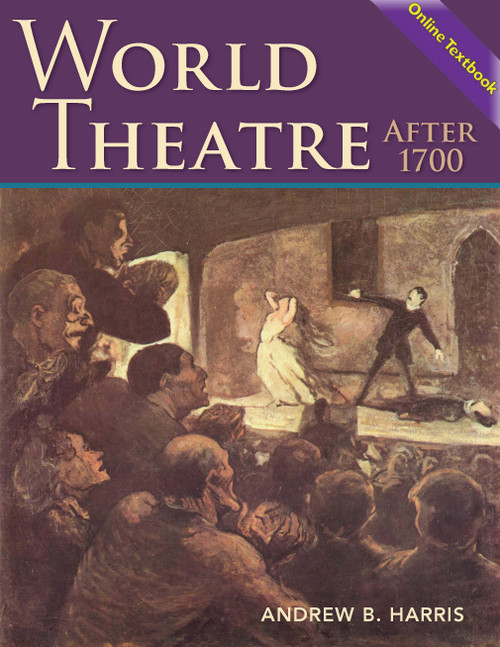Find & Buy Your Book
Find & Buy Your Book
- Home
- Music and Fine Arts
- World Theatre After 1700 (Harris, Andrew B.) - Online Textbook
World Theatre After 1700 (Harris, Andrew B.) - Online Textbook
Product Description
Title: World Theatre After 1700
Author: Andrew B Harris
ISBN: 978-0-9998294-8-6
About the Author:
Andrew B. Harris (author) has written two award-winning theatre books: The Performing Set (UNT Press) and Broadway Theatre (Routledge). With Sentia, he has published a two-volume series: World Theatre before and World Theatre after 1700. Dr. Harris’s broad range of experience includes play writing (The Lady Revealed, The Eternal Romeo and Juliet, and Advanced Stages), directing (Antigone, The Misanthrope, The Importance of Being Earnest, The Crucible, Private Lives, Who’s Afraid of Virginia Woolf, Once Upon A Mattress, and a virtual production of The Diary of Anne Frank) and producing (The Life of Galileo – Time’s Ten Best New York season, Cowboy Mouth, Idol Hill). His plays have been presented in Texas, New York, and London. He collaborated with Edward Albee on Albee Directs Albee and Albee’s Women, and also produced the first Sam Shepard retrospective. Andrew was the Founding Chair of the Hammerstein Center at Columbia University. Later, he chaired the Theatre Departments at Southern Methodist University and Texas Christian University before becoming Professor of Theatre at the University of North Texas. An alumnus of New Dramatists, Dr. Harris earned his doctoral degree from Columbia University and his bachelor’s from the University of Chicago, where he graduated with Special Honors. Together with his wife Ann and their Golden Retriever, Gwinny, the Harrises live in McKinney, Texas.
Recommendations & Reviews:
“I highly recommend World Theatre Before 1700, by Professor Andrew Harris. It is a major contribution to the study of drama, since it projects an elegance of presentation, and it is easy to read. The effect is further enhanced with the accompanying visual images. As the Director of Translation Studies, I am particularly interested in the translation from one culture to another as well as the translation from page to stage. The volume presents a refreshing insight into how plays come to live in the minds of the reader. An insightful study!”
—Rainer Schulte, PhD, Director, Center for Translation Studies, University of Texas at Dallas.
“Students of theatre must have a foundational knowledge of theatre history to bring meaning and context to their art. Andrew B. Harris’ two history volumes, World Theatre Before 1700 and World Theatre After 1700, present an impressive depth of content on both the geographic and temporal expanse of theatre history. Both volumes, which are conveniently available in electronic format, provide valuable and accessible instruction for any college theatre programs that wish to invest in students’ historical understanding of the power and evolution of the theatre.”
—Kerry Goldmann, PhD, Lecturer, Associate Director of Graduate Studies, Department of History, University of North Texas.
“Andrew Harris’s online volume, World Theatre After 1700 provides students and scholars with an incredible arsenal of tools for exploring global theatre history, concentrating on acting and design. There are capsule analyses of key works, myriad images, biographies of major actors, scenic designers and directors, and above all, a review of the historical and cultural events that inspired and animated the world’s dramatic legacy. The addition of images of important works of art from four centuries reveals the complex interplay between societies and the stages that have reflected them. Harris’s concise and suggestive observations provide a rich, interconnected tapestry of a dynamic art form.”
—John Wharton Lowe, Barbara Methvin Distinguished Professor, University of Georgia
“Dr. Andrew Harris’ World Theatre After 1700 is first-rate, profoundly informative, and delightfully readable history of theater. Having taught world drama for over two decades at the university level, I wish I’d had Dr. Harris’ book in my classroom. Dr. Harris touches on the art and theater of non-European cultures, but his focus is on Western drama, featuring evocative depictions of actors and playwrights, composers and artists, philosophers, and kings. The book features countless paintings and etchings, posters and photos that make theatre history come alive. World Theatre is a perfect introduction for all areas of theatre professionals, from actors and directors, to designers of sets, costumes, lights, sound and props—the whole panoply of theatre production—as well as for anyone with an interest in world culture, and the theatre in particular.”
—Dr. W. Stuart McDowell, Professor, Chair and Artistic Director, Emeritus, Department of Theatre, Dance & Motion Pictures, Wright State University, Frederick A White Distinguished Professor of Professional Service, Wright State University.
“A well-researched and useful book, [this] volume will be instrumental in the near and distant future, standing to help theatre studies achieve a more central position in humanities-based core curricula. In its expansive rendering of historical context and in its mastery of aesthetic achievement, [this] volume has integrity having achieved coherency and consistency in inviting readers to apprehend the development of theatre over time. Theatre thus comes to life off the page. I see Dr. Harris’s World Theatre after 1700 influencing the quality of American higher education and scholarly enquiry well into the future, for students and faculty alike.”
—James Duban, PhD, Professor of English, Associate Dean of Research, Honors College, University of North Texas
 Loading... Please wait...
Loading... Please wait... 







